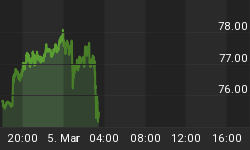Anyone looking for thrills these days should forget roller coasters and skydiving. Instead, simply buy a few shares of U.S. stock. The past year has reminded us how truly stomach-churning the financial ride can be. And after a white-knuckled drop in 2008, investors who held on are now enjoying a dizzying ascent. In the past five months alone, the S&P has risen by 22 percent and the NASDAQ by 33 percent. Emerging markets are back almost to their pre-recession levels. Even individual American stocks have performed in a stellar manner. Apple, Cisco and Oracle have all risen by over 200 percent. Ford, an aging relic once given up for dead, has risen by 268 percent!
But what we have seen is more than just a lesson in physics. Stocks are not going up only because they previously went down. We are witnessing a return of hope. While the change is heartening, it is sadly based on the flimsiest of evidence.
The current rally has been sparked by some modestly good news: the Purchasing Managers' Index is up, GDP has retracted by only 1 percent, and the fall in home values appears to be leveling off. Taken together, the appearance of these 'green shoots' has many, such as Larry Summers and Tim Geithner, convinced that the recession is over.
Somewhat more guarded than his colleagues within the Administration, Fed Chairman Ben Bernanke testified to Congress that he foresaw a "jobless recovery." One is left to wonder how an economy burdened with double-digit unemployment can recover without new jobs. In recent decades, there have been some jobless recoveries from mild recessions, but they were built upon asset booms. Today, we face a very deep recession. The asset boom has collapsed. A jobless recovery in an economy based on 72 percent consumer spending is an oxymoron.
Unless our economy can go through a needed and painful reorganization, in which the industrial sector is revitalized, recovery from this recession will have to be based upon consumer demand. With unemployment increasing at over 500,000 workers a month, wages dropping, and hours worked declining, it is hard to see consumer demand rising convincingly enough to provide the engine for a rebound.
Meanwhile, U.S. Treasury debt is exploding, the U.S. dollar falling, and unemployment rising. In such circumstances, how can the stock market rise be trusted? What is the reality?
Added to this conundrum, credit remains tight, despite the injection into the banks of vast amounts of Fed funds at zero percent. And, for the first time, banks are being paid interest on the reserves required to be held at the Fed. Paradoxically, this hidden taxpayer boost to banks' earnings is one of the prime reasons for tight credit. What bank would lend to corporations or individuals, incurring risk, when it can lend to the Fed - at considerable profit - without risk?
With the consumer still in shock and denied credit, why do some indicators appear positive?
The short answer for this is massive deficit and stimulus spending by the federal government. More than $3 trillion alone this year. That's nearly $10,000 for every citizen of this country. Little wonder that some consumers have 'handout' money to spend. And it's no surprise that after a massive sell-off, certain retailers are refilling their inventories, causing the Purchasing Managers' Index to rise. Likewise, now the threat of a banking collapse has passed, albeit temporarily, the rate of job cuts can be expected to fall.
Looking ahead, there is a $3.4 trillion commercial mortgage problem due to face the banks in September. This most sobering prospect, combined with the various pressures on consumers, would appear to indicate that the American economy is in the 'eye' of an economic hurricane. When jobs fail to materialize and credit remains frozen, look for corporate earnings to remain depressed. This reality can only be ignored for so long.
Any investor in U.S. stocks and bonds should be extremely wary, particularly as autumn may well herald a rise in interest rates and, as a result, another round of collapses. The ride up may have been fun. But remember last year before you dare to hold on for more.
For a more in-depth analysis of our financial problems and the inherent dangers they pose for the U.S. economy and U.S. dollar, read Peter Schiff's 2007 bestseller "Crash Proof: How to Profit from the Coming Economic Collapse" and his newest release "The Little Book of Bull Moves in Bear Markets." Click here to learn more.
More importantly, don't let the great deals pass you by. Get an inside view of Peter's playbook with his new Special Report, "Peter Schiff's Five Favorite Investment Choices for the Next Five Years." Click here to dowload the report for free. You can find more free services for global investors, and learn about the Euro Pacific advantage, at www.europac.net.















